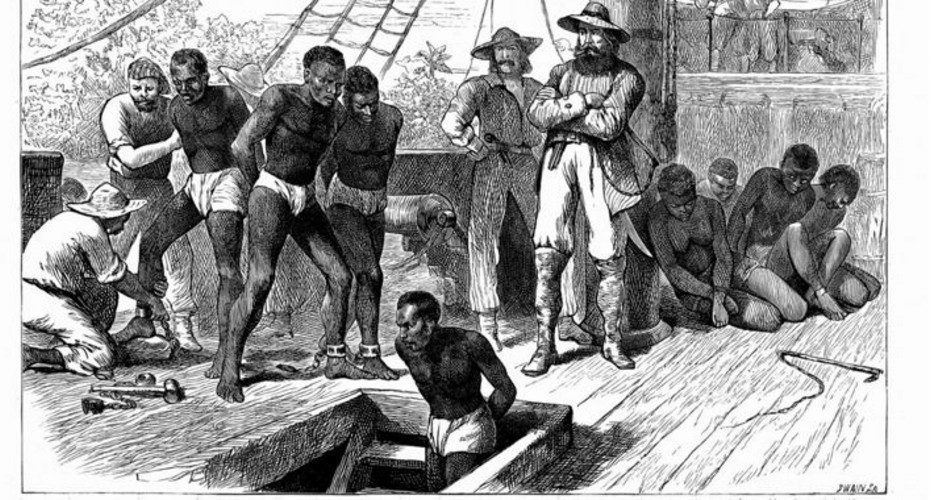
In a recent interview, Barack Obama expressed the shopworn belief that America has not “overcome” the legacy of “slavery.” The president was not, apparently, talking about how Americans are essentially enslaved to the government until April 24, which in 2015 was the day we had to work until to pay the nation’s tax burden. (Note: According to the Tax Foundation, Americans spent “more on taxes in 2015 than … on food, clothing, and housing combined.”) Rather, he was referring to the slavery that ended 151 years ago.
Obama made his comments Monday night while being interviewed at the White House by Trevor Noah, host of Comedy Central’s Daily Show (video below). After Noah asked him how he skirts “that line between speaking your mind and sharing your true opinions on race whilst, at the same time, not being seen to alienate some of the people you are talking to,” Obama replied that while race isn’t the only factor in our lives, “we have, by no means, overcome the legacies of slavery and Jim Crow and colonialism and racism, but that the progress we’ve made has been real and extraordinary; if I’m communicating my genuine belief that those who are not subject to racism can sometimes have blind spots or lack of appreciation of what it feels to be on the receiving end of that, but that doesn’t mean that they’re not open to learning and caring about equality and justice.”
It’s apparent that when Obama was speaking of “those who are not subject to racism [and] can sometimes have blind spots,” he wasn’t referring to himself, even though he’s not targeted with white-privilege theory or “safe spaces” from which whites are excluded. (In fact, Obama enjoyed a somewhat privileged upbringing, attending the elite Punahou School in Hawaii — tuition: $20,000 a year.)
Obama’s excessive focus on the slavery that once occurred in America is lamentable but not surprising, and indicates a lack of perspective. For instance, a striking fact is universally ignored: Europeans and Americans might not have been the first to practice slavery.
But they were the first to end it.
Slavery is one of the world’s oldest institutions, once present in most places and in every time — including places such as Africa in our time. The Egyptians, Spartans, and Romans practiced slavery, as did many African tribes, the latter of which would then also sell slaves to European traders. Of course, primitive civilizations might actually consider slavery merciful, as the other option often was death (for captured foes), sometimes as a human sacrifice in a pagan ceremony (à la the Aztecs). Note also that the term “slave” at least partially derives from “Slav” precisely because so many Slavs — white people — were once sold into bondage.
Of course, a critic will point out that these facts do nothing to change the reality of American slavery’s “legacy.” But what is that reality? As Dr. Walter Williams wrote in his 2001 piece “The Legacy of Slavery Hustle”:
Illegitimacy among blacks today is 70 percent. Only 41 percent of black males 15 years and older are married, and only 36 percent of black children live in two-parent families. These and other indicators of family instability and its accompanying socioeconomic factors such as high crime, welfare dependency and poor educational achievement is claimed to be the legacy and vestiges of slavery, for which black Americans are due reparations. Let’s look at it.
In 1940, illegitimacy among blacks was … [14 percent]. From 1890 to 1940, blacks had a marriage rate slightly higher than whites. As of 1950, 64 percent [of] black males 15 years and older were married, compared to today’s 41 percent.
In Philadelphia, in 1880, two-parent family structure was: black (75.2 percent), Irish (82.2 percent), German (84.5 percent) and native white Americans (73.1 percent). In other large cities such as Detroit, New York and Cleveland, we find roughly the same numbers.
According to one study of black families (Herbert G. Gutman, “The Black Family in Slavery and Freedom, 1750-1925”), “Five out of six children under the age of 6 lived with both parents.”
That study also found that, in Harlem between 1905 and 1925, only 3 percent of all families were headed by a woman under 30 and 85 percent of black children lived in two-parent families.
The question raised by these historical facts is: If what we see today in many black neighborhoods, as claimed by reparation advocates, are the vestiges and legacies of slavery, how come that social pathology wasn’t much worse when blacks were just two or three generations out of slavery? Might it be that slavery’s legacy and vestiges have a way, like diabetes, of skipping generations?
In fact, the “slave-plainers” are like a skipping record, indulging the insanity of saying the same thing over and over again even though the results are in. Dr. Williams reports that today the statistics are even worse than when he penned his 2001 article, with, for example, the black illegitimacy rate now being almost 75 percent. He also tells us, “Black youth unemployment in some cities is over 50 percent. But high black youth unemployment is also new. In 1948, the unemployment rate for black teens was slightly less than that of their white counterparts — 9.4 percent compared with 10.2.” Note that this figure, too, is worse now than in 2001.
Moreover, whites and other groups have exhibited similar trends. The white illegitimacy rate in 1960 was 2.3 percent. Now it’s almost 30 percent.
Is this also due to the “legacy of slavery”?
And given that all groups are following these patterns, paralleling one another, is it logical to blame such a legacy in the case of one particular group? Or does it make more sense to identify a factor they all have in common?
Reverend Jesse Lee Peterson, head of the group Brotherhood Organization for a New Destiny, identified this factor when stating, “The lack of moral character is the number one problem in the black community today.” In fact, our civilization is in a state of moral crisis, one affecting all within it. We see this in the rampant moral relativism; decline in faith; corruptive philosophy in academia; and the sexual messages peddled and license encouraged by entertainment, the media, and schools.
This is why the “legacy” excuse is actually evil. You cannot address a problem until you first acknowledge it; you cannot prescribe the correct cure without first making the correct diagnosis. Of course, it’s understandable why it’s not made. It’s man’s nature to seek excuses, to blame outside forces for one’s woes as opposed to taking personal responsibility. As for the statist powers-that-be, not only are they more than happy to serve up the excuses to win votes and gain and maintain power, but it’s hard to grow government by stressing personal responsibility. So they’d rather blame “society” and always be able to claim we need more affirmative action, quotas, big-government programs, and bureaucratic oversight to stamp out “systemic racism” — with no end in sight.
What we really need to overcome is the legacy, and continuing reality, of leftist thought.


